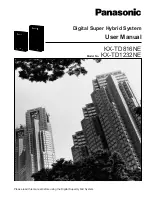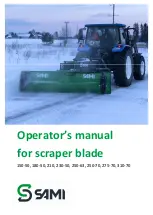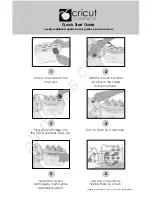
0 %
100 %
0 %
100 %
0 %
100 %
0 %
100 %
0 %
100 %
0 %
100 %
0 %
100 %
0 %
100 %
Sensing range min.
Sensing range max.
Set switching point
Figure 5: Signal strength light bar during adjustment
The optimum setting can be achieved and checked using the signal strength light bar on
the back of the sensor. The LEDs on the signal strength light bar light up in relation to the
object position and the set switching point. If no LEDs or only the red LEDs light up, the
object is positioned in front of the set switching point and cannot be detected. The first yel‐
low LED lights up when the object is behind the set switching point. More green LEDs light
up when the object is moved further away from the sensor into the background (
). The sensor is adjusted and ready for operation. Refer to graphics
to check the function. If the switching output fails to behave in accordance the
graphic, check application conditions. See section Fault diagnosis.
The sensor is adjusted and ready for operation.
4
Alarm output
The sensor (HTE18) features a pre-failure notification output (“Q2” in connection diagram
[B], if the alarm option is selected), which issues a notification if the signal strength of the
light being received is not sufficient. Possible causes: Sensor is contaminated, sensor is
out of alignment. In the good state: LOW (U
V
< V); if excessively contaminated: HIGH (>+U
V
-
V). The LED indicator flashes in this case.
Health output: The sensor (HTE18) features a health status notification output (“Q2” in
connection diagram [B], if the health option is selected), which issues a notification if the
signal strength of the light being received is sufficient. Possible causes, if the signal
strength is not sufficient: Sensors are contaminated, sensors are out of alignment, or
cable is damaged. In the good state: HIGH (>+U
V
- V); if excessively contaminated or in the
event of cable interruption: LOW (U
V
< V). The LED indicator flashes in this case.
Time types: HTE18 with optional On-delay or Off-Delay adjustment: t0 = no time delay, t1 =
time delay when object is detected, t2 = time delay when no object is detected. The time
setting can be selected using the potentiometer according to A.
Timer stages can be set from 0 to 2 seconds.
8
Troubleshooting
The Troubleshooting table indicates measures to be taken if the sensor stops working.
Table 11: Troubleshooting
LED indicator/fault pattern
Cause
Measures
Yellow LED does not light up
even though the light beam is
aligned to the object and the
object is within the set sensing
range
No voltage or voltage below
the limit values
Check the power supply,
check all electrical connec‐
tions (cables and plug connec‐
tions)
Voltage interruptions
Ensure there is a stable power
supply without interruptions
Sensor is faulty
If the power supply is OK,
replace the sensor
8
TROUBLESHOOTING
18
8017851.16K9 | SICK
Subject to change without notice
Summary of Contents for H18 - SureSense
Page 1: ...O P E R A T I N G I N S T R U C T I O N HTE18 Hybrid photoelectric sensors...
Page 24: ...B E T R I E B S A N L E I T U N G HTE18 Hybrid Lichtschranken de en es fr it ja pt ru zh...
Page 70: ...M A N U A L D E I N S T R U E S HTE18 Barreiras de luz h bridas de en es fr it ja pt ru zh...
Page 115: ...I N S T R U C C I O N E S D E U S O HTE18 Fotoc lulas h bridas de en es fr it ja pt ru zh...
Page 137: ...HTE18 de en es fr it ja pt ru zh...
Page 158: ...HTE18 de en es fr it ja pt ru zh...
Page 180: ...HTE18 de en es fr it ja pt ru zh...
















































